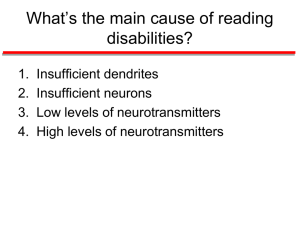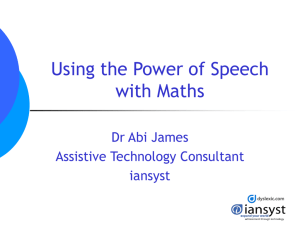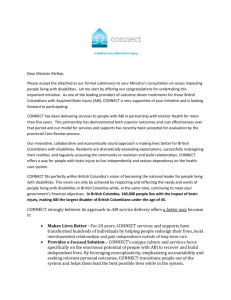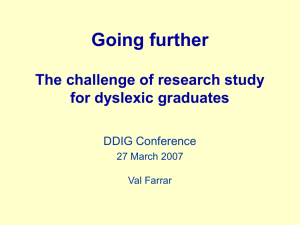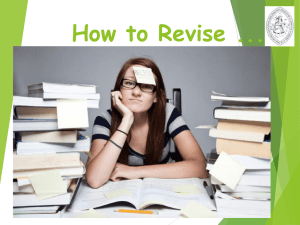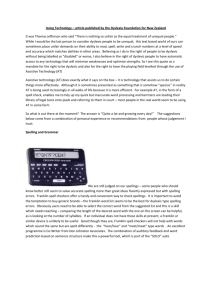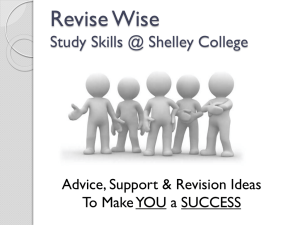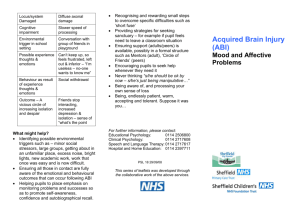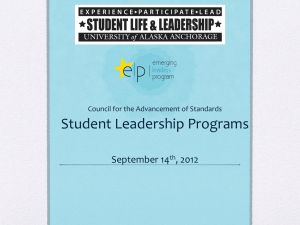ICT supporting development of organisational and
advertisement
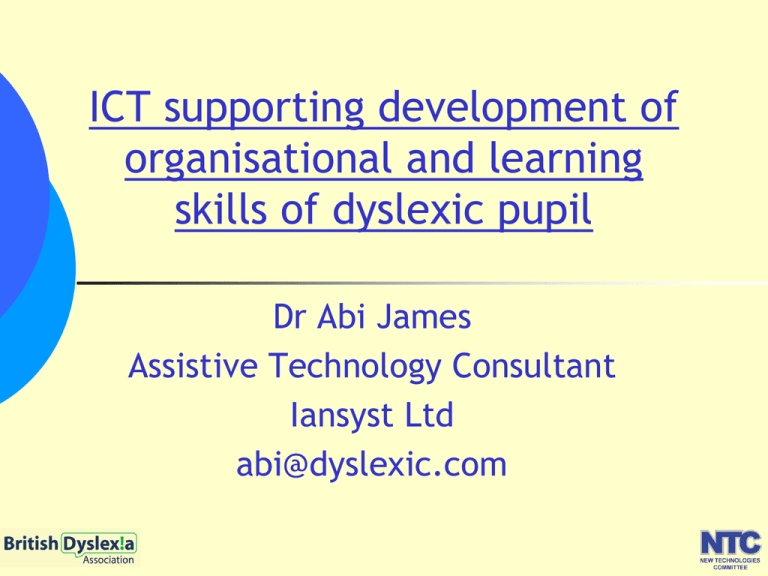
ICT supporting development of organisational and learning skills of dyslexic pupil Dr Abi James Assistive Technology Consultant Iansyst Ltd abi@dyslexic.com Organisation & Learning skill development can be affected by: Poor working memory. Poor / slow handwriting skills. Poor decoding skills. Slow processing speeds. Difficulties with sequencing and developing automaticity. Co-morbidity with other SpLD such as dyspraxia, ADHD. Can lead to difficulties with: Making notes. Organising thoughts. Time management and day-today organisation. Memory. Directions. Example of learning tasks affected: Noting down homework/coursework requirements. Making accurate notes from long text, websites and research materials. Organising thoughts to structuring an essay or report. Expressing ideas and knowledge verbally or in writing. Accurately recalling information in exams. Using ICT with children with dyslexia: Nonjudgemental and motivational feedback Multi-sensory teaching environment Adaptable and personalised working environment Time-saving and editing tools Some examples of technologies in action: Mind / Concept Mapping software. Time Management support. Note-taking support. Accessible reading formats. Why is Mind/Concept Mapping useful? Concept and mind maps can help higher student performance in: Vocabulary. Reading comprehension. Critical thinking. Learning a foreign language. Comprehension & retention of scientific material & concepts. Writing. Note taking. Higher order thinking. Problem solving. Retention & recall of information. With concept mapping software: No limit on size of map. Many tools for improving the presentation of the map e.g. banks of images. spell checkers. text-to-speech. Import & export functions enable the map to be converted into different formats e.g. export a text version to a word processor. plan a presentation or web site by a map & then create it. Examples of Concepts maps for organisation Revision map Revision map with audio examples Explaining a maths concept Framework for a science experiment Group work Group work Note-taking Support: Tablet PCs Using Audio to support notetaking and revision Time Management support Accessing Text Providing curriculum materials in an electronic, accessible format enables pupils to alter the display to suit their needs to hear them read aloud. Harnessing Technology and the future Increased availability of technology in the classroom. Evidence that technology in the classroom can provide motivation and independence. Example: using mobile phones to support the curriculum. Mobile Phone Uses in Class 1 2 3 4 5 6 7 8 9 10 11 12 13 14 15 Timing experiments with stopwatch. Photographing apparatus and results of experiments for reports. Photographing development of design models for eportfolios. Photographing texts/whiteboards for future review. Bluetoothing project material between group members. Receiving SMS & email reminders from teachers. Synchronising calendar/timetable and setting reminders. Connecting remotely to school learning platform. Recording a teacher reading a poem for revision. Accessing revision sites on the Internet. Creating short narrative movies . Downloading and listening to foreign language podcasts. Logging into the school email system. Using GPS to identify locations. Transferring files between school and home. Assistive Tools on Mobile Phones Speech tools for reading aloud documents, web pages and text in photos (e.g. CapturaTalk). Specialist spell checkers and dictionaries (e.g. SpellEx). Mind mapping applications (e.g. Inspiration). Access to accessible curriculum resources (e.g. Audio notes or podcasts, DAISY books) . The Future Important that technology planning & use in education: Considers the needs and requirements of pupils with S.E.N., e.g. Accessibility of virtual learning platforms. Benefits such technology provides for pupils with S.E.N. Additional training and strategies required to access these benefits. e.g. Lexdis project on e-learning in H.E. Contact: Abi James iansyst Ltd, Fen House, Fen Road, CAMBRIDGE, CB4 1UN. 01223 42 01 01. abi@dyslexic.com ianl@dyslexic.com


